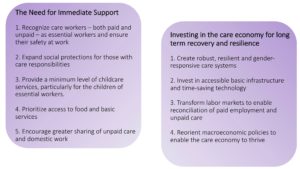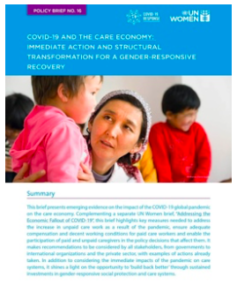
A recent brief from UN Women presents emerging evidence on the impact of the COVID-19 global pandemic on the care economy.
Evidence suggests that the rising demand for care in the context of the COVID-19 crisis and response will likely deepen already existing inequalities in the gender division of labor, placing a disproportionate burden on women and girls. Not only are women over-represented among paid health care workers, girls and women also shoulders the bulk of unpaid care and domestic work that sustains families and communities on a day-to-day basis.
School closures and household isolation across the globe are moving the work of caring for children from the paid economy—schools, day-care centers, and babysitters—to the unpaid economy. So far, 1.27 billion students (72.4 percent) across 177 countries have been affected by school closures (UNESCO). The lack of childcare support is particularly problematic for essential workers, including those in the health sector, who have care responsibilities.
This brief recommends ways to transform care systems now and for the future – both the need for immediate support and the need for sustained investment in the care economy for long term recovery and resilience.
How to Transform Care Systems – Now and for the future
(UN Women, 2020)

Authors/editor(s): Bobo Diallo, Seemin Qayum, and Silke Staab 2020

